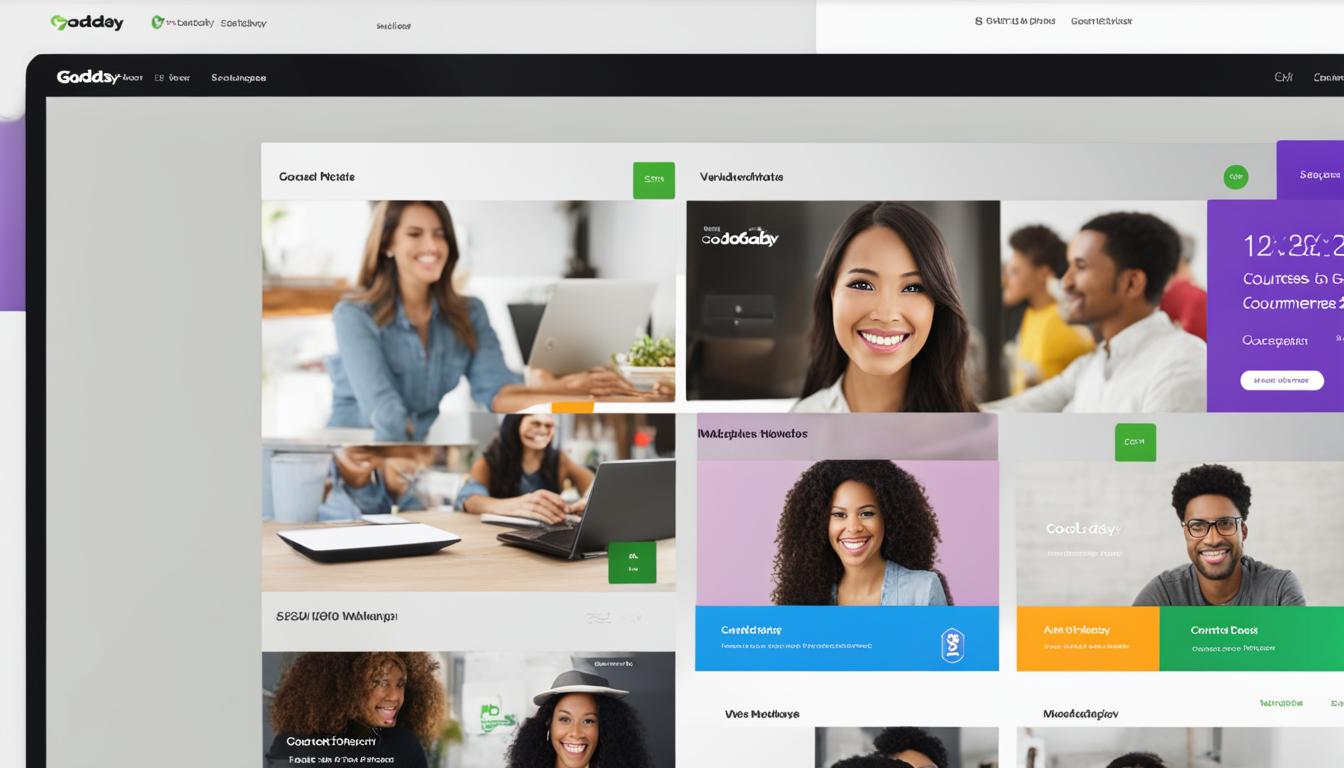How to Find Out Who is Hosting a Certain Website (2 Ways)
Did you know that there are over 1.8 billion websites on the internet today? That’s right, billions of websites serving different purposes, from personal blogs to e-commerce giants. But have you ever wondered who is behind a particular website? Whether you want to know who set up your own website, discover your competitor’s hosting provider, or take action against a website that has stolen your content, finding out who is hosting a certain website is essential.
Fortunately, there are two simple ways to achieve this. In this article, I will guide you through two effective methods that will help you uncover the hosting provider of any website, giving you valuable insights into their website hosting details. So let’s dive in and find out how you can locate the hosting provider of a certain website.
Key Takeaways:
- Knowing who is hosting a certain website can provide valuable information for various purposes, such as understanding who set up your own website or identifying your competitor’s hosting provider.
- You can find out who is hosting a certain website by using a WordPress Theme Detector tool or checking the WHOIS information.
- The WordPress Theme Detector tool can analyze a website and provide details about the hosting provider, although some websites may use CDN services or website firewalls that can obscure the actual host.
- WHOIS information is a public directory that contains details about domain name registration, including the hosting provider. By using a WHOIS Lookup tool, you can retrieve information about the host by searching for the “Name Server” entry.
- Additional methods for finding hosting information include checking billing records, contacting the website developer or owner, and searching for host information on the website itself.
Using a WordPress Theme Detector Tool
The WordPress Theme Detector tool is an invaluable resource for determining the hosting provider of a website. By simply entering the URL of the website, this tool can analyze it and provide comprehensive information about the hosting provider. This includes the name of the hosting company, such as Unified Layer (Newfold Digital), New Dream Network (DreamHost), or Media Temple (owned by GoDaddy).
However, it’s important to note that the actual hosting provider may sometimes be obscured due to the usage of CDN services or website firewalls by certain websites. Nevertheless, the WordPress Theme Detector tool remains an efficient and effective method for detecting hosting providers and gaining valuable insights into website details.
| WordPress Theme Detector Features: |
|---|
| 1. Determine the hosting provider of a website |
| 2. Access information about the hosting company, such as Unified Layer (Newfold Digital), New Dream Network (DreamHost), or Media Temple (owned by GoDaddy). |
| 3. Identify the usage of CDN services or website firewalls |
Using the WordPress Theme Detector tool is a quick and efficient way to gain insights into the hosting provider of a website. Whether you’re conducting competitive research or simply curious about a website’s infrastructure, this tool provides you with the necessary information at your fingertips.
Checking WHOIS Information
When it comes to finding out who is hosting a certain website, one of the most reliable methods is by checking the WHOIS information. WHOIS is a public directory that provides details about the registration of a domain name, including the hosting provider. By utilizing a WHOIS Lookup tool, you can easily retrieve the information you need.
Start by entering the URL of the website into the WHOIS Lookup tool. This tool will then search its database to retrieve the necessary information about the host. Pay attention to the “Name Server” entry, as this indicates the hosting company responsible for the website.
To gain further insights into the hosting provider, you can conduct a quick search using the nameserver on Google or other search engines. This will help you find out more about the company and its hosting services. However, keep in mind that some websites may use Content Delivery Networks (CDNs) instead of specific hosting providers. In such cases, the nameserver may lead to a CDN like Cloudflare.
| Domain Name | Registration Date | Name Server | Hosting Provider |
|---|---|---|---|
| example.com | 2022-01-01 | ns1.hostingprovider.com | Hosting Provider A |
| example.net | 2022-02-01 | ns2.hostingprovider.com | Hosting Provider B |
Using the IsItWP Website
IsItWP offers a range of helpful tools for WordPress users. One of these tools allows you to perform a domain name lookup and gather valuable information about websites. By simply entering a domain name, you can access details about the website’s hosting information, whether it is using WordPress as its content management system, and even the specific WordPress plugins and theme in use. This comprehensive tool provides you with insights that can be instrumental in your website research and analysis.
While the IsItWP tools are incredibly useful, it’s important to note that they may require slightly more time compared to the previous methods discussed. However, the depth of information you receive in return makes it well worth the extra time investment. Let’s take a closer look at how the IsItWP domain lookup tool works and how it can assist you in your website investigations.
To begin, navigate to the IsItWP website at www.isitwp.com. Once there, you’ll find the domain lookup tool prominently displayed on the homepage. Alternatively, you can directly access the tool by visiting https://www.isitwp.com/wordpress-hosting-checker/.
To use the IsItWP domain lookup tool, simply enter the domain name you wish to investigate into the provided search field. Then, click on the “Check Now” button to initiate the search. The tool will then process the information and generate a detailed report for you, uncovering key data about the website’s hosting provider, WordPress usage, and more.
Note: In the search results, you may come across websites that have opted to hide their information or use privacy protection services. In such cases, the tool may not be able to provide detailed insights about the website’s hosting provider or other related data.
The IsItWP website not only offers the domain lookup tool but also provides additional resources and guides for WordPress users. You can explore various articles, tutorials, and recommendations to enhance your knowledge and skills when it comes to WordPress development and management.
With the IsItWP tools at your disposal, you can gain valuable insights into the inner workings of websites, including their hosting information, WordPress usage, and more. This knowledge can be instrumental in your website research, competitive analysis, and decision-making processes. Use the IsItWP website to unlock a wealth of information and take your WordPress journey to new heights.

Additional Methods for Finding Hosting Information
If you are looking to find hosting information for your own website, there are a few additional methods you can try. These methods can help you locate the necessary details when other options fall short. Here are some steps you can take:
- Check Billing Records: Start by reviewing your billing records for any information related to your web hosting. This may include invoices, payment receipts, or email confirmations that mention the hosting provider.
- Contact the Website Developer: If you worked with a website developer or agency to create your website, reach out to them and inquire about the hosting information. They should have access to the necessary details or be able to guide you in the right direction.
- Search for Host Information: Take some time to explore your website and look for any visible information about the hosting provider. Check the footer, “About” page, or any other sections that might mention the web host. Sometimes, the hosting company’s logo or name may be displayed prominently.
- Contact the Website Owner: If all else fails, you can try reaching out directly to the website owner or editor for their hosting provider details. Use the contact form on their website or any other available means of communication to inquire about their hosting provider. They might be able to provide you with the necessary information or direct you to the right source.

By following these additional methods, you can increase your chances of finding the hosting information you need for your website. Remember to be polite and professional in your interactions, as people are more likely to help if you approach them with respect and courtesy.
Evaluating Hosting Providers
When evaluating hosting providers, there are several key factors to consider to ensure you make the right decision for your website. Take into account the following aspects:
- Uptime Guarantee: One crucial factor is the uptime guarantee offered by the hosting provider. Look for providers that offer a generous uptime guarantee, ideally above 99%. This ensures that your website remains accessible to visitors, minimizing downtime and potential revenue loss.
- Server Speed: The speed at which your website loads is critical for user experience and SEO. A slow-loading website can lead to high bounce rates and lower search engine rankings. Look for hosting providers that offer fast servers and utilize technologies like solid-state drives (SSDs) for improved performance.
- Customer Support: Reliable customer support is essential in case you encounter any technical issues or have questions about your hosting service. Opt for providers that offer responsive and knowledgeable customer support through various channels such as live chat, email, or phone.
- Pricing Comparison: Comparing pricing plans is crucial to find a hosting provider that fits your budget. Take into account the features and resources included in each plan, such as storage, bandwidth, and the number of websites you can host. Consider long-term pricing as well, as introductory discounts may change upon renewal.
Sample Pricing Comparison
| Hosting Provider | Uptime Guarantee | Server Speed | Customer Support | Price (per month) |
|---|---|---|---|---|
| Provider A | 99.9% | Fast | 24/7 live chat, email, phone | $9.99 |
| Provider B | 99.5% | Medium | Email, phone (limited hours) | $7.99 |
| Provider C | 99.95% | Ultra fast | 24/7 live chat | $12.99 |
Based on the information provided, it is crucial to evaluate hosting providers based on their uptime guarantee, server speed, customer support, and pricing plans. By considering these factors, you can make an informed decision and choose a hosting provider that meets your specific needs and budget.
Understanding Backlinks and SEO
Backlinks are an essential component of search engine optimization (SEO) and play a significant role in determining a website’s ranking on search engine results pages. The number and quality of backlinks a page has from unique and reputable websites can greatly impact its performance in organic search.
The correlation between backlinks and organic traffic is undeniable. When a page earns backlinks from authoritative sources, it signals to search engines that the content is valuable, trustworthy, and relevant. As a result, search engines are more likely to prioritize that page when determining search rankings.
However, it’s important to note that not all backlinks are created equal. Link quality is equally crucial as link quantity, if not more. Search engines prioritize high-quality backlinks that come from authoritative, trustworthy websites. These backlinks carry more weight and have a stronger impact on SEO.
Acquiring high-quality backlinks should be a priority in any SEO strategy. To do so, it’s essential to engage in link-building practices that focus on establishing relationships with reputable websites in your industry. This may involve reaching out to relevant influencers or industry experts to collaborate on content creation or guest posting on authoritative websites. By acquiring backlinks from reputable sources, you can improve organic traffic and enhance the overall effectiveness of your SEO efforts.
Importance of Backlinks and Organic Traffic
| Backlink Quality | Correlation with Organic Traffic |
|---|---|
| Low-quality backlinks from spammy or irrelevant websites | Minimal impact on organic traffic |
| High-quality backlinks from reputable and authoritative websites | Significant increase in organic traffic |
| Mix of high-quality and low-quality backlinks | Overall impact on organic traffic is influenced by the ratio between high-quality and low-quality backlinks |
By prioritizing the acquisition of high-quality backlinks, you can improve your website’s visibility, drive more organic traffic, and strengthen your overall SEO strategy. Remember, it’s not just about the quantity of backlinks, but the quality that matters most.
Taking Action with Link Data
Building strong relationships with serial linkers is essential for maximizing the potential of your link data. These are individuals or websites that consistently link to your content, indicating a genuine interest in what you have to offer. To foster these relationships, engage with them regularly by acknowledging their support and sharing their content when relevant. By building a rapport and providing value to each other, you can create a mutually beneficial partnership that encourages ongoing linking and boosts your website’s visibility.
Another valuable strategy is to analyze your most linked content. By understanding which types of content attract the most links, you can tailor your future content strategy to capitalize on its success. Look for patterns and themes that resonate with your audience and try to replicate them in future posts. Additionally, identify the characteristics of your most linked content, such as its format, topic, or style, and use this information to create more high-quality, link-worthy content.
Reclaiming broken links is also crucial for optimizing your link data. Broken links occur when a page on another website that previously linked to yours no longer exists or has been moved. By regularly monitoring your link profile and identifying broken links, you can take steps to reclaim their value. Reach out to the website owner or webmaster and inform them about the broken link. Provide them with the correct URL or an alternative piece of content that they can link to instead. By fixing these broken links, you ensure a seamless user experience and regain the SEO benefits that come with them.
In conclusion, taking action with your link data involves building relationships with serial linkers, analyzing your most successful content, and reclaiming broken links. By implementing these strategies, you can enhance your website’s visibility, improve your SEO efforts, and drive more organic traffic to your website.
FAQ
How can I find out who is hosting a certain website?
How does the WordPress Theme Detector tool work?
What information can I obtain from WHOIS lookup?
Can I use IsItWP to find hosting information about a website?
How else can I find hosting information for a website?
What factors should I consider when evaluating hosting providers?
Why are backlinks important for SEO?
How can I take action with link data?
- How Strategic SEO Drove Growth for a CPAP E-commerce Brand - July 24, 2025
- Top 3 SEO Companies in Toronto: An Analytical Comparison - July 23, 2025
- SEO for Entry Door Services - April 24, 2025





















Post Comment
You must be logged in to post a comment.